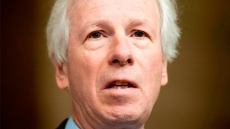LONDON — The British government scrambled Thursday to save the country's struggling steel industry after Tata Steel announced plans to sell its U.K. plants, which employ almost 20,000 people.
Prime Minister David Cameron held a crisis meeting at 10 Downing St., and said the government would do "everything it can" to keep steelmaking in Britain.
But, he said, "this is a difficult situation. There's no guarantee of success."
"This industry is in difficulty right across the world," Cameron said. "There's been a collapse in prices, there's massive overcapacity."
The steel industry in Britain, like many developed economies, has been hit hard by cheap Chinese imports, which have depressed prices, and manufacturers have asked the government and European Union to impose anti-dumping duties.

Tata Steel, which operates the country's biggest steel plant at Port Talbot in south Wales, is losing 1 million pounds ($1.4 million) a day in Britain, the U.K. government has said. A sale or restructuring would likely involve heavy job losses in places like Port Talbot, a battered but proud steel town where Tata employs 5,500 people.
Tuesday's decision by the Indian company to shed its British steelworks appeared to catch U.K. authorities by surprise. Cameron was on vacation in the Canary Islands, while Business Secretary Sajid Javid was in Australia.
Javid, who quickly flew back to Britain, said the steel industry "is absolutely vital for the country and we will look at all viable options" to save it.
The opposition Labour Party has urged the government to nationalize the steel industry — as it did struggling banks, which received billions in public money to keep them afloat during the 2008 financial crisis.


"If we vote leave and take back control we would actually have the power to combat unfair dumping of steel," he said.
But Cameron, who wants Britain to remain in the 28-nation bloc, said half of British steel is exported to EU countries, and leaving might mean it became subject to tariffs.






